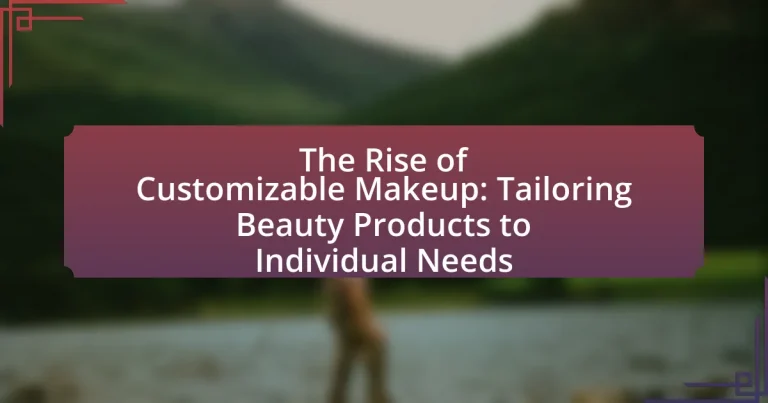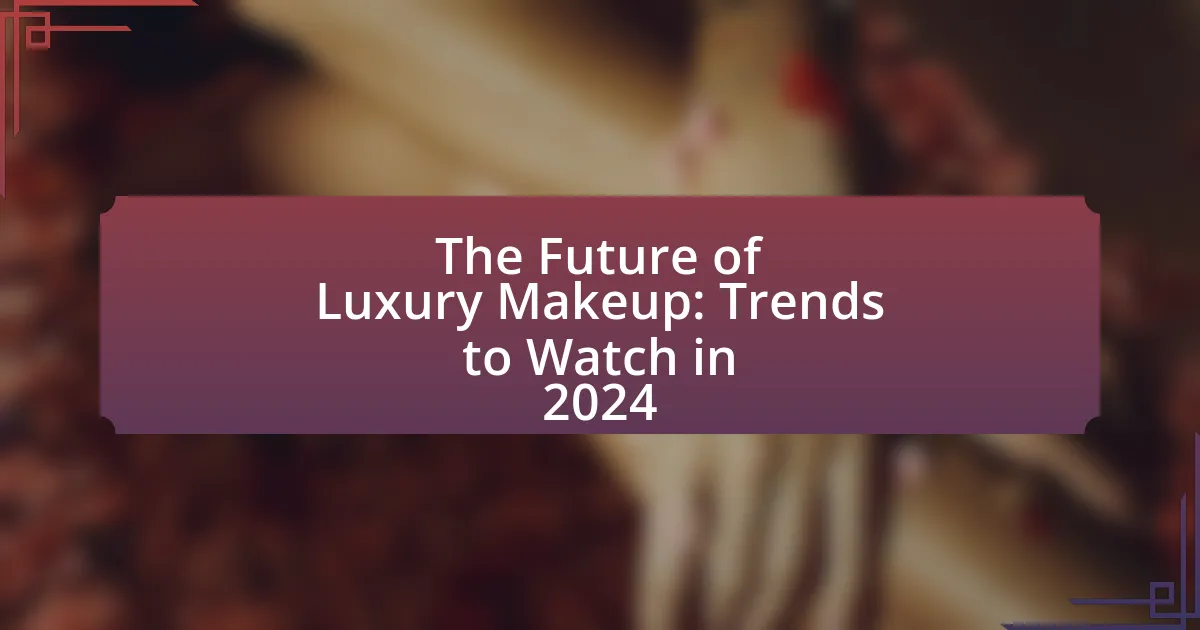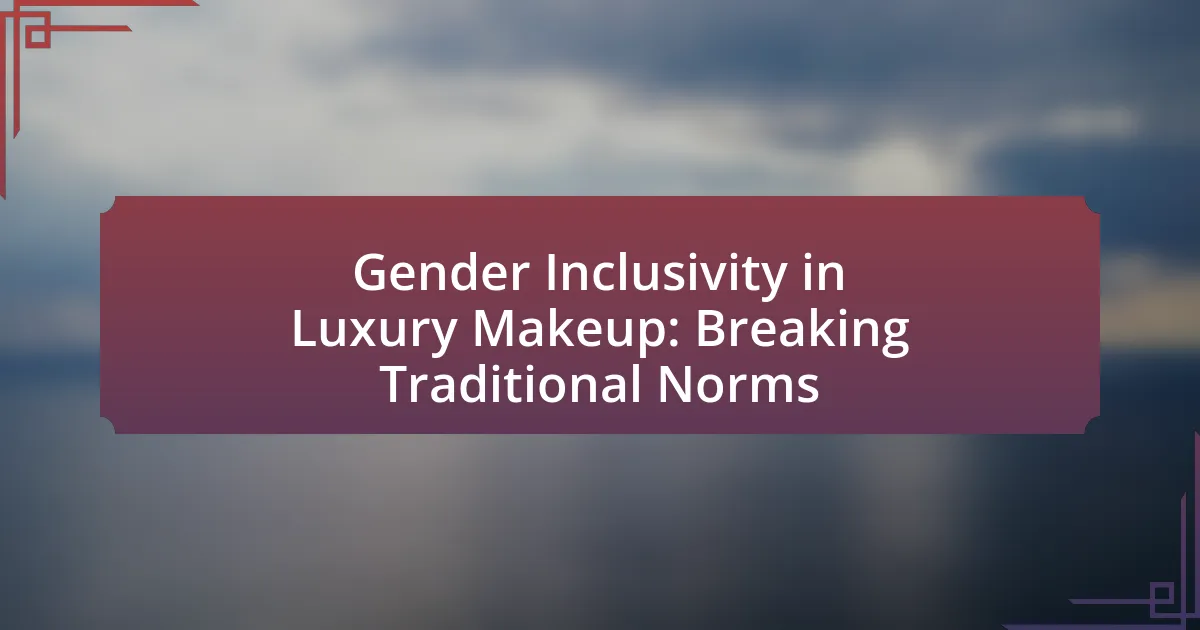Customizable makeup refers to beauty products that allow users to personalize formulations, shades, and finishes according to their individual preferences and skin types. The article explores the evolution of customizable makeup, highlighting advancements in technology and consumer demand for personalized beauty solutions. It discusses historical trends influencing this rise, the impact of consumer preferences, and the role of social media in shaping the market. Additionally, the article examines the key features of customizable products, the technologies enabling personalization, and the challenges faced by the industry, including regulatory considerations and quality assurance. Future trends and emerging consumer demands for sustainability and inclusivity are also addressed, providing a comprehensive overview of the customizable makeup landscape.
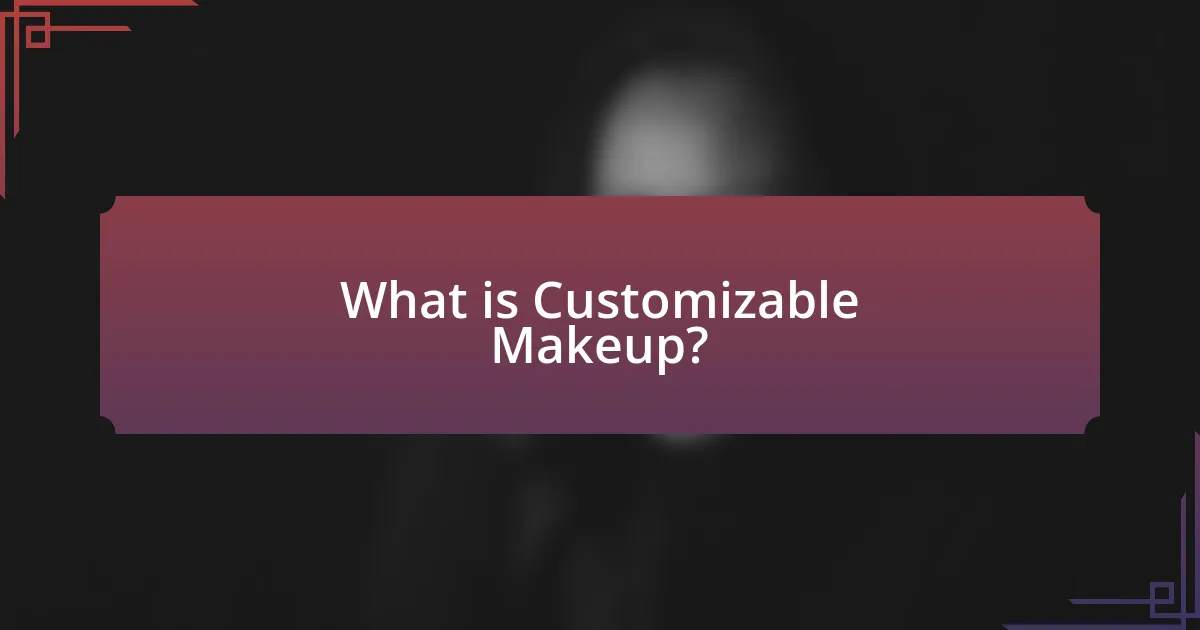
What is Customizable Makeup?
Customizable makeup refers to beauty products that allow users to tailor formulations, shades, and finishes to their individual preferences and skin types. This personalization can include options for selecting specific colors, textures, and ingredients, enabling consumers to create a unique makeup experience that meets their specific needs. The rise of customizable makeup is supported by advancements in technology and consumer demand for personalized beauty solutions, with brands increasingly offering products that cater to diverse skin tones and preferences.
How has customizable makeup evolved over time?
Customizable makeup has evolved significantly from basic color choices to advanced personalization technologies. Initially, makeup products offered limited shades and formulations, primarily catering to broad demographics. Over time, advancements in technology and consumer demand for individuality led to the introduction of customizable options, such as mixable foundations and personalized palettes.
In recent years, brands have utilized artificial intelligence and augmented reality to create tailored experiences, allowing consumers to virtually try products and receive recommendations based on their unique features. For instance, companies like Fenty Beauty and Glossier have pioneered inclusive shade ranges and customizable kits, reflecting a shift towards catering to diverse skin tones and preferences. This evolution is supported by market research indicating that the global customizable beauty market is projected to grow significantly, highlighting the increasing consumer desire for personalized beauty solutions.
What historical trends have influenced the rise of customizable makeup?
The rise of customizable makeup has been influenced by several historical trends, including the shift towards individualism in the late 20th century and advancements in technology. The individualism movement, particularly during the 1960s and 1970s, emphasized personal expression and self-identity, leading consumers to seek products that reflect their unique preferences. Additionally, the advent of digital technology and e-commerce in the 21st century has enabled brands to offer personalized products, allowing consumers to select shades, formulations, and packaging tailored to their specific needs. This combination of cultural shifts and technological innovations has significantly contributed to the growing demand for customizable makeup options.
How do consumer preferences shape the development of customizable makeup products?
Consumer preferences significantly influence the development of customizable makeup products by driving brands to create offerings that cater to individual needs and desires. As consumers increasingly seek personalized beauty solutions, companies respond by integrating features such as shade matching, ingredient selection, and packaging options that allow for customization. For instance, a survey by Statista in 2021 indicated that 60% of consumers prefer products tailored to their specific skin types and tones, prompting brands to invest in technology that enables personalized formulations. This trend not only enhances customer satisfaction but also fosters brand loyalty, as consumers feel more connected to products that reflect their unique identities and preferences.
Why is customizable makeup gaining popularity?
Customizable makeup is gaining popularity due to the increasing demand for personalized beauty solutions that cater to individual preferences and skin types. Consumers are seeking products that allow them to express their unique identities and meet specific needs, such as skin tone matching and ingredient sensitivities. According to a report by Grand View Research, the global customizable cosmetics market is projected to grow significantly, driven by consumer trends favoring tailored experiences over one-size-fits-all products. This shift reflects a broader movement towards individuality in beauty, where brands that offer customization options are more likely to resonate with today’s consumers.
What factors contribute to the demand for personalized beauty products?
The demand for personalized beauty products is primarily driven by consumer desire for individuality and tailored solutions. This trend is fueled by the increasing awareness of diverse skin types, preferences, and beauty concerns, leading consumers to seek products that specifically address their unique needs. According to a report by Grand View Research, the global personalized beauty market is expected to reach $25.1 billion by 2025, highlighting the significant growth in consumer interest. Additionally, advancements in technology, such as AI and data analytics, enable brands to offer customized recommendations, further enhancing consumer engagement and satisfaction.
How does social media impact the popularity of customizable makeup?
Social media significantly enhances the popularity of customizable makeup by providing a platform for brands and consumers to share personalized beauty experiences. Influencers and users showcase unique makeup looks, demonstrating the versatility and creativity that customizable products offer. According to a 2021 survey by Statista, 54% of social media users reported discovering new beauty products through platforms like Instagram and TikTok, highlighting the role of social media in shaping consumer preferences. This visibility encourages brands to innovate and cater to individual needs, further driving the trend of customizable makeup.
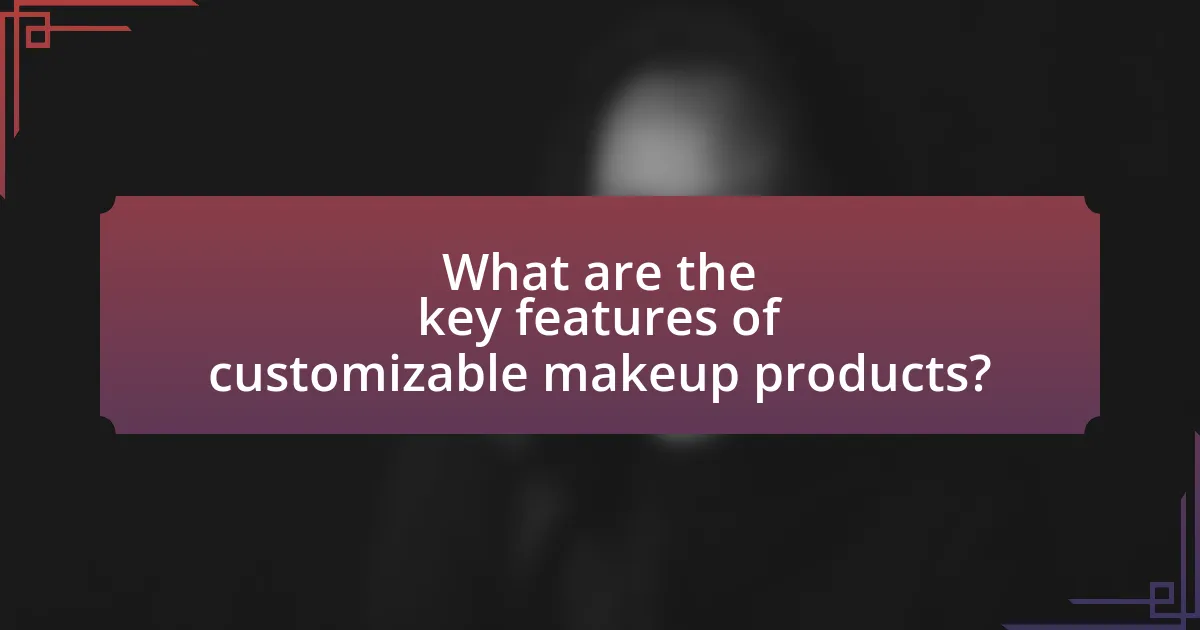
What are the key features of customizable makeup products?
Customizable makeup products feature personalization options that allow consumers to tailor shades, formulations, and packaging to their specific preferences. These products often include a wide range of color choices, enabling users to mix and match to achieve their desired look. Additionally, customizable makeup may offer various textures and finishes, such as matte or glossy, to suit individual skin types and styles. Brands frequently provide online tools or in-store consultations to assist customers in selecting the best combinations for their unique needs. This trend is supported by market research indicating that 60% of consumers prefer products that can be personalized, reflecting a growing demand for individualized beauty solutions.
How do customization options enhance user experience?
Customization options enhance user experience by allowing individuals to tailor products to their specific preferences and needs. This personalization fosters a deeper emotional connection between the user and the product, leading to increased satisfaction and loyalty. For instance, studies show that 80% of consumers are more likely to purchase from brands that offer personalized experiences, highlighting the importance of customization in driving consumer behavior. Additionally, customizable makeup products enable users to select shades, formulations, and packaging that align with their unique skin tones and styles, further enhancing their overall experience and satisfaction with the product.
What types of customization are available in makeup products?
Customization in makeup products includes options such as shade selection, formulation adjustments, packaging personalization, and ingredient choices. Shade selection allows consumers to choose colors that match their skin tone or personal preference, while formulation adjustments can cater to specific skin types, such as oily, dry, or sensitive skin. Packaging personalization enables customers to select designs or engravings that reflect their style, and ingredient choices allow for the inclusion or exclusion of specific components, such as allergens or vegan ingredients. This trend is supported by the growing demand for personalized beauty solutions, as evidenced by a 2021 survey indicating that 70% of consumers prefer products tailored to their individual needs.
How do consumers choose their preferred customization options?
Consumers choose their preferred customization options based on personal preferences, product functionality, and social influences. Research indicates that individual factors such as skin type, color preferences, and desired outcomes significantly impact their choices. For instance, a study published in the Journal of Consumer Research found that consumers are more likely to select customization options that align with their self-identity and aesthetic goals. Additionally, social media trends and peer recommendations play a crucial role in shaping consumer decisions, as individuals often seek validation and inspiration from their social circles. This combination of personal relevance and external influence drives consumers to select specific customization features that resonate with their unique beauty needs.
What technologies enable customizable makeup?
Technologies that enable customizable makeup include augmented reality (AR), artificial intelligence (AI), and 3D printing. AR allows users to virtually try on different makeup products and shades in real-time, enhancing the shopping experience by providing a personalized view. AI algorithms analyze user preferences and skin tones to recommend tailored products, ensuring a better match for individual needs. Additionally, 3D printing technology enables the creation of bespoke makeup formulations and applicators, allowing consumers to design products that suit their specific requirements. These technologies collectively enhance the customization of makeup, making it more accessible and personalized for users.
How does technology facilitate personalized makeup solutions?
Technology facilitates personalized makeup solutions by utilizing advanced algorithms and artificial intelligence to analyze individual skin tones, preferences, and facial features. For instance, apps and devices can scan a user’s face to recommend shades and products that best match their unique characteristics, ensuring a tailored experience. Research from the Journal of Cosmetic Science indicates that AI-driven tools can improve customer satisfaction by up to 30% by providing personalized recommendations based on user data. This integration of technology not only enhances the shopping experience but also empowers consumers to make informed choices about their makeup products.
What role do apps and online platforms play in customization?
Apps and online platforms play a crucial role in customization by enabling users to personalize their makeup products according to individual preferences and needs. These digital tools provide features such as virtual try-ons, shade matching, and personalized recommendations based on user data, which enhance the customization experience. For instance, platforms like Sephora’s Virtual Artist allow users to see how different products look on their skin tone, facilitating informed choices. Additionally, data analytics from these platforms help brands understand consumer preferences, leading to more tailored product offerings. This integration of technology in the beauty industry exemplifies how apps and online platforms are transforming the customization landscape.
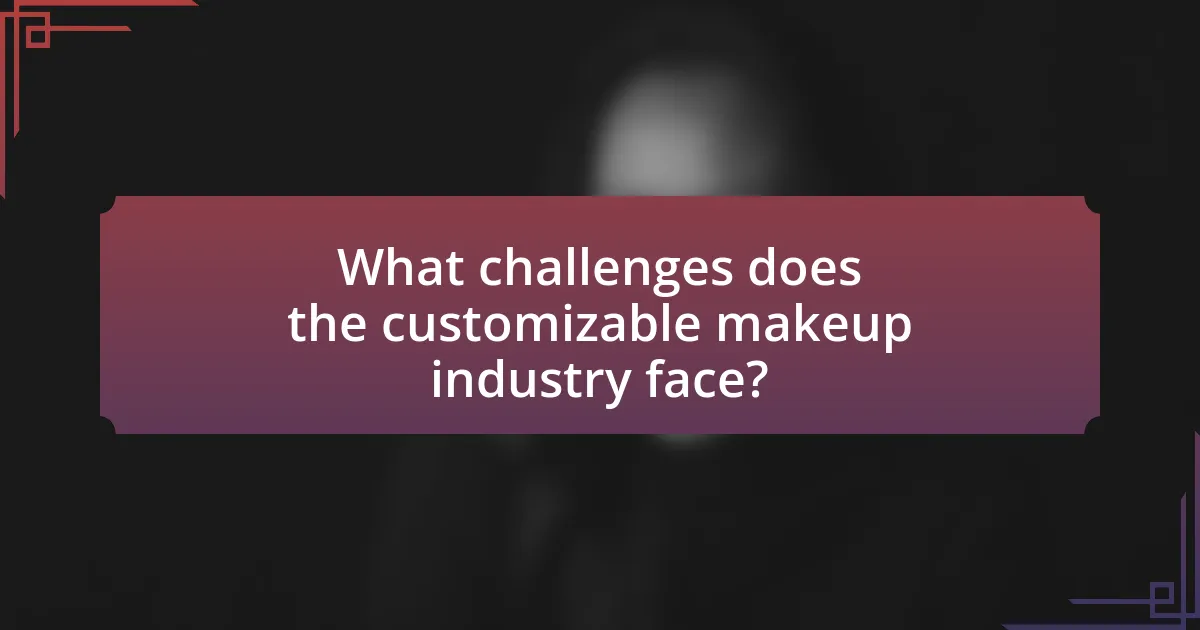
What challenges does the customizable makeup industry face?
The customizable makeup industry faces significant challenges, including high production costs and complex supply chain logistics. These challenges arise because creating personalized products often requires specialized ingredients and manufacturing processes, which can increase expenses. Additionally, managing inventory for a wide range of customizable options complicates logistics, leading to potential inefficiencies and waste. According to a report by Grand View Research, the global cosmetics market is projected to reach $463.5 billion by 2027, indicating a competitive landscape where companies must balance customization with cost-effectiveness to succeed.
How do brands ensure quality in customizable products?
Brands ensure quality in customizable products by implementing rigorous quality control processes throughout the production cycle. This includes using high-quality raw materials, conducting thorough testing of formulations, and employing advanced technology to maintain consistency in product performance. For instance, brands often utilize automated systems to monitor ingredient ratios and ensure that each customizable product meets established safety and efficacy standards. Additionally, customer feedback is actively integrated into product development, allowing brands to refine their offerings based on real user experiences, which further enhances quality assurance.
What are the risks associated with product personalization?
The risks associated with product personalization include data privacy concerns, potential for misalignment with consumer preferences, and increased production costs. Data privacy concerns arise as companies collect and analyze personal information to tailor products, which can lead to breaches or misuse of sensitive data. Misalignment with consumer preferences can occur if the personalization does not accurately reflect individual needs, resulting in dissatisfaction and potential loss of customer loyalty. Increased production costs stem from the need for more complex supply chains and manufacturing processes to accommodate customized products, which can impact pricing and profitability.
How can brands maintain consistency in customizable makeup offerings?
Brands can maintain consistency in customizable makeup offerings by implementing standardized formulations and quality control processes. Standardized formulations ensure that each customizable product adheres to specific quality benchmarks, allowing for uniformity across different batches. Quality control processes, such as regular testing and feedback loops, help identify and rectify any inconsistencies in product performance or color matching. For instance, companies like Fenty Beauty utilize advanced technology to analyze customer preferences and maintain product integrity, ensuring that even personalized products meet the same high standards as their core offerings. This approach not only enhances customer satisfaction but also builds brand trust and loyalty.
What regulatory considerations impact customizable makeup?
Regulatory considerations impacting customizable makeup include compliance with safety and labeling standards set by authorities such as the FDA in the United States and the EU Cosmetics Regulation in Europe. These regulations mandate that all cosmetic products, including customizable options, must be safe for use, properly labeled with ingredient lists, and free from harmful substances. For instance, the FDA requires that any claims made about the product must be substantiated, ensuring that customizable makeup formulations do not mislead consumers. Additionally, manufacturers must adhere to Good Manufacturing Practices (GMP) to ensure product consistency and safety, which is crucial for products tailored to individual preferences.
How do regulations affect the formulation of customizable makeup products?
Regulations significantly impact the formulation of customizable makeup products by establishing safety, labeling, and ingredient restrictions that manufacturers must adhere to. These regulations, enforced by agencies such as the FDA in the United States and the EU Cosmetics Regulation in Europe, ensure that all ingredients used in makeup formulations are safe for consumer use and properly disclosed on product labels. For instance, the EU Cosmetics Regulation prohibits the use of certain harmful substances, which directly influences the selection of ingredients in customizable products. Additionally, regulations require that any claims made about the products, such as “hypoallergenic” or “non-comedogenic,” must be substantiated, affecting how brands formulate their offerings to meet consumer expectations while remaining compliant.
What labeling requirements must brands adhere to for customized products?
Brands must adhere to specific labeling requirements for customized products, including accurate ingredient listings, allergen disclosures, and compliance with local regulations. The Fair Packaging and Labeling Act mandates that all products must clearly state the identity of the product, the net quantity, and the name and address of the manufacturer. Additionally, customized products must include any specific instructions or warnings related to their unique formulations, ensuring consumer safety and informed usage. Compliance with these requirements is essential to avoid legal repercussions and to maintain consumer trust.
What are the future trends in customizable makeup?
Future trends in customizable makeup include the integration of artificial intelligence and augmented reality to enhance personalization. Brands are increasingly utilizing AI algorithms to analyze individual skin tones, preferences, and facial features, allowing for tailored product recommendations. Additionally, augmented reality technology is being employed to enable virtual try-ons, giving consumers the ability to visualize how products will look on their skin before purchase. According to a report by Grand View Research, the global customizable cosmetics market is expected to grow significantly, driven by consumer demand for personalized beauty solutions. This trend reflects a broader shift towards individualized experiences in the beauty industry, emphasizing the importance of catering to unique consumer needs.
How might advancements in technology shape the future of customizable makeup?
Advancements in technology will significantly shape the future of customizable makeup by enabling personalized formulations and application methods. Innovations such as AI-driven skin analysis tools can assess individual skin types and conditions, allowing brands to create tailored products that meet specific needs. For instance, companies like Proven Skincare utilize algorithms to analyze user data and formulate skincare products that cater to unique skin profiles. Additionally, 3D printing technology can facilitate the on-demand production of makeup products, allowing consumers to customize colors and textures in real-time. This shift towards personalization is supported by market trends indicating a growing consumer preference for bespoke beauty solutions, with a report from Statista projecting the global personalized beauty market to reach $25 billion by 2025.
What emerging consumer trends could influence the customizable makeup market?
Emerging consumer trends that could influence the customizable makeup market include the increasing demand for personalization, sustainability, and inclusivity. Personalization is driven by consumers seeking products that cater specifically to their unique skin tones, types, and preferences, with 70% of consumers expressing a desire for tailored beauty solutions. Sustainability trends are pushing brands to adopt eco-friendly practices, as 54% of consumers are willing to pay more for sustainable products, prompting customizable options that align with ethical values. Inclusivity is also crucial, as brands that offer a wider range of shades and formulations are more likely to attract diverse consumer bases, reflecting the growing awareness of representation in beauty.
What tips can consumers follow when choosing customizable makeup products?
Consumers should prioritize their skin type and tone when choosing customizable makeup products. Understanding whether your skin is oily, dry, or combination helps in selecting formulations that enhance your natural beauty. Additionally, matching the makeup shade to your skin tone ensures a seamless blend, which is crucial for a natural look. Research indicates that 60% of consumers prefer products tailored to their specific skin needs, highlighting the importance of personalization in makeup choices. Furthermore, reading reviews and seeking recommendations can provide insights into product performance and suitability, aiding consumers in making informed decisions.
